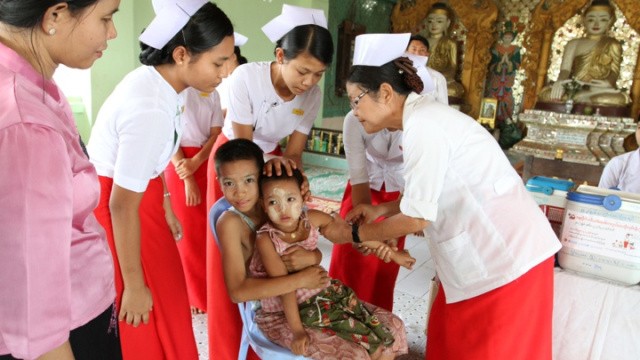News & Updates
World Health Day
07 April 2017

The World Health Day, marked on 7th April, highlights the importance of ensuring health and well-being for everyone, at every stage of life. Despite significant progress made over the last decade to meet health related targets, 130 million people (21% of population) in South-East Asia (SEA) do not have access to basic health services. The region also has the lowest density of health professionals with a deficit of 6.9 million health workers.
The incidence of major infectious diseases, including HIV, tuberculosis (TB) and malaria, has declined globally since 2000. SEA accounts for the largest number of new TB cases and 41% of the global TB incidence burden.
Maternal and child health are also amongst regional priorities. One of the highest rates of child mortality is in SEA where 1 in 19 dies before their fifth birthday and one in three is affected by stunting (WHO, 2015). The latter is 10% higher than the global average of 23%.
Challenges in achieving health SDGs have urged global and regional agencies to look for innovative ways to improve health systems and programmes. Technology and partnerships are paramount to ensure that desired universal health care access is achieved in an affordable and sustainable way. The WHO has identified eHealth as the foundation for its strategy in South-East Asia for 2014–2020.
Sustained innovation, collaboration and public-private partnerships are vital to advancing health SDGs, from battling malaria and neglected tropical diseases to improving access to reproductive healthcare, to development at large.
Key decision-makers from the UN and government agencies, NGOs, Red Cross, research institutes and the private sector will gather at the upcoming Aid & Development Asia Summit to look at how technological innovations can improve aid delivery and health resilience in SEA.
Dr Thet Khine Win, Permanent Secretary of the Myanmar Ministry of Health and Sports will deliver a keynote speech at the Summit. Other specialists in the field, including Dr. Aye Yu Soe, Senior Public Health Officer, Three Millennium Development Goal (3MDG) Fund of UNOPS and Penelope Campbell, Chief, Health and Nutrition, Young Child Survival and Development, UNICEF will share insights on how to improve health systems and health financing in order to reduce maternal and under-five mortality rates, eliminate communicable diseases and increase access to healthcare services in the region.
Charles Nelson, Chief Executive Officer, Malaria Consortium and Daniel Crapper, Country Director, PSI Myanmar will share an update on regional health programmes and collaborations and improving access to HIV/AIDS prevention and counselling. Dr Tobe Makoto, Senior Advisor, Health Financing and Health Systems, Japan International Cooperation Agency (JICA), Dr Ni Ni, Country Director, Ipas Myanmar and Dr Sid Naing, Country Director, Myanmar, Marie Stopes International focus on overcoming challenges of child and maternal health, especially in remote areas and temporary settlements and establishing robust medical systems to better support children and women.
Building on the success of the previous years, the 3rd annual Aid & Development Asia Summit will take place on 14-15 June at the Myanmar International Convention Centre (MICC-2) in Nay Pyi Taw. Gathering 250+ high-profile attendees and 45+ speakers, the Summit is an exclusive platform uniting regional and global expertise, offering an unparalleled opportunity for knowledge exchange, cross-sector engagement and collaboration.
A participant of last year’s Aid & Development Asia Summit in Bangkok, Sammy Njoe, Regional Chief ICT at UNICEF says that “the Summit was very useful from a content perspective and networking opportunity”.
For more information about the Aid & Development Asia Summit, visit http://asia.aidforum.org
For any enquiries, please contact Alina O’Keeffe, Head of Marketing at Aid & International Development Forum (AIDF) at marketing@aidforum.org